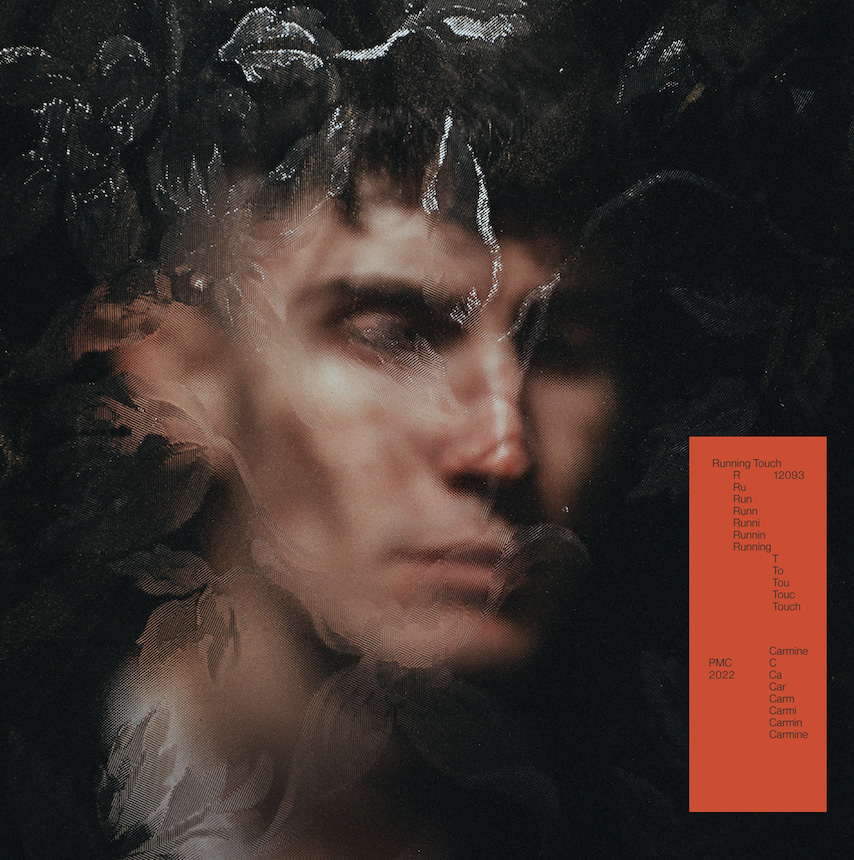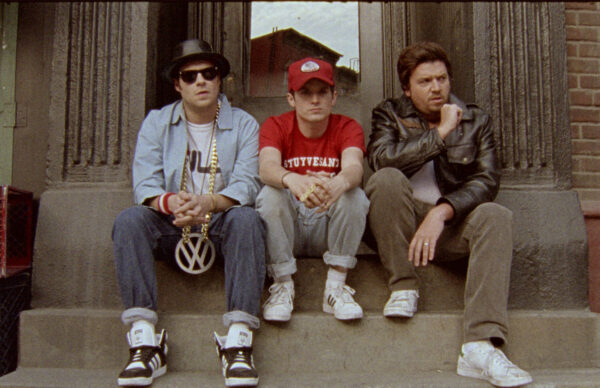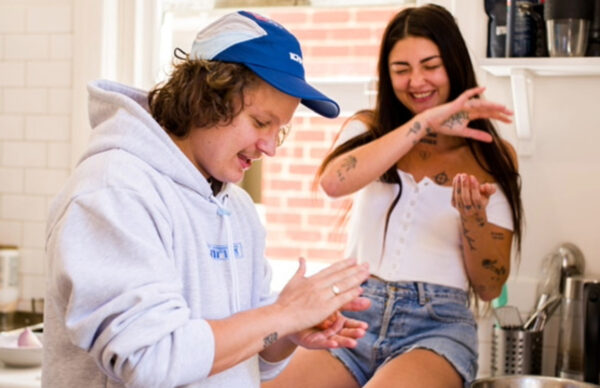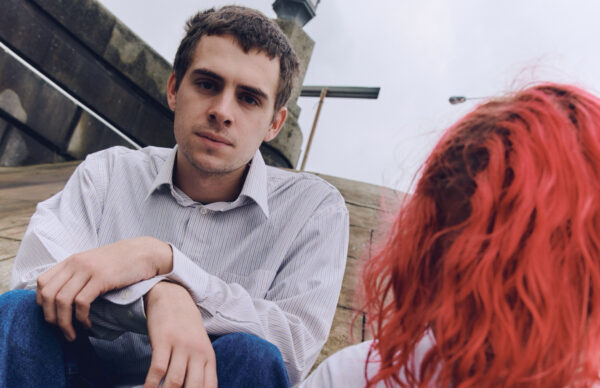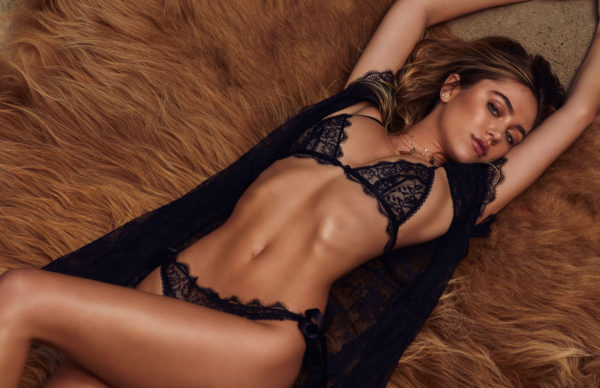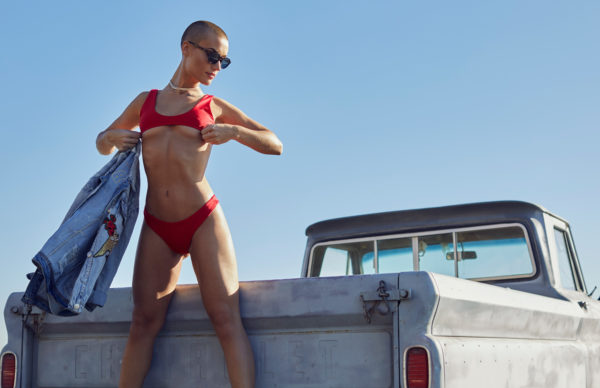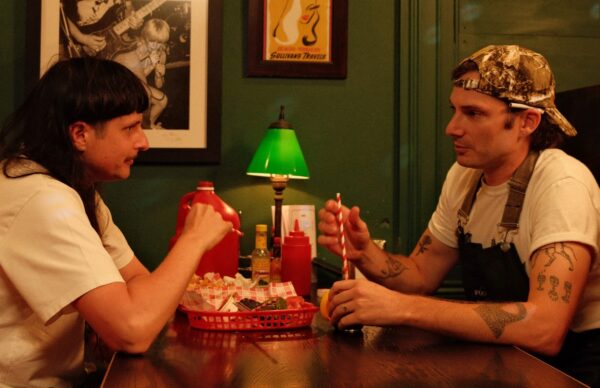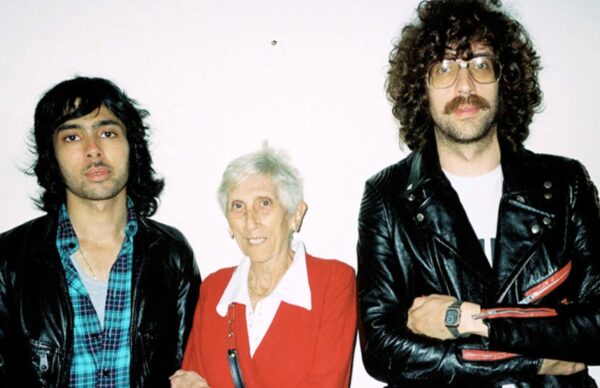Image via Josh Hourigan //
The elusive muso sits down with us for a full deep dive into the new album…
Running Touch is a name that’s been impossible to escape the last couple of years. A festival mainstay, in-demand producer/vocalist and visceral live act who’s made short work of some of the biggest stages in the country. He’s been on a one way rise to the top as of late, and it seems like that rise is about to get a whole lot more explosive.
His latest album Carmine sees the producer double down on the hybridised dance/rock duality he burst onto the scene with all of those years ago. An album about the violence within, it taps into that archaic need within us to simply dance the night away and find some sense of fulfilment within the beat. From the visceral ‘Come With Me’ to ‘Ceilings’ and the buzzing title track, it’s Running Touch at his most chaotic, focused and most importantly, free.
We caught up with the elusive producer ahead of his Coachella debut with Hayden James to chat the new record, his producer journey and everything on the horizon. Check it below.
You’re in America for Coachella right now! How are you feeling?
I’m feeling good! Obviously grateful for the opportunity to sing at it and just be here. It’s nice to be in the epicentre for all of the creative things going on right now. It feels good!
I saw at For The Love you were getting up to some climbing on stage and getting deep into the crowd. Do you have any similar plans in store for the Coachella crowd?
That’s a good question [laughs]. I hadn’t thought that far ahead yet to be honest, but now that you said that I probably should. Technically it’s Hayden [James] show, so I think I have to behave to some extent [laughs].
View this post on Instagram
It’s wild that ‘Carmine’ is your debut album, considering how long you’ve been around and everything you’ve done. Why so long for it?
I think it’s just a natural progression, to be honest with you. I’m really glad that I waited this long. I’m a producer first and I think it’s taken a while to shake that urge to pursue so many different genres.
I think now that I’m a bit older and more mature, and I know how to be more cohesive and concise, it’s just the right time. I’ve always been chasing a song that would be good to base an album off, and it just happened really naturally with this one. I had two songs that sounded kind of similar and I was like “Sweet. Let’s do it.”
You produced pretty much everything on this album yourself. What freedoms did that level of creative control enable you while creating it?
Great question. That’s a hard one [laughs]. I don’t even know where to start with that to be honest. I mean, it’s everything that you’d think it is. It’s like running your own business. You get to choose the branding, employees, what you sell and so on. I just get to choose everything, which is both a blessing and a curse as you have to make all the executive decisions, which is the hardest thing to do as an artist [laughs].
But I think that’s what make the journey so interesting because you’ll go through so many emotions of just being like “What am I doing? Do I do this or that?” You feel amazing one day, but then you’ll be like “What the hell am I doing?!” the next. Then you finish it and you’ll start asking yourself “Does this even make sense?” It’s everything man.
You’ve said that “Carmine is a record about violence”. I’m guessing you’re referring to a violence within, but can you break it down a bit for us?
It’s funny you ask that, because I didn’t realise how vague that statement was until I started getting asked about it. So I’m really glad I’m having to verbalise it now.
So ‘Carmine’ is the name of the album, but it’s also the colour red. Specifically, the colour of blood. And it’s also very brooding, a very intimate colour and it’s a word that has a lot of intimacy associated with it. So you’ve got a pretty vivid palette right there.
As for the violence, it’s more of a violence within, as you just said. Even just going further with it, all of the violent themes are the conceptual songs. ‘Carmine’ and ‘Juno’ are based off films, the Mexico trilogy, and other flicks like The Third Man, Reservoir Dogs, Dusk Till Dawn and so on. So there’s violence in those films in terms of people getting shot and things like that, not from personal experience of course [laughs]. Those are just the stories that have influenced me and I’ve created from. So that’s more were the violence comes from, the conceptual side.
This album feels a real love affair to guitar work, especially the title track. Was that a conscious effort going into this album? To highlight your affinity for that instrument?
I haven’t got to talk about this yet so I’m so glad you asked this question. 100% man. I don’t even know where to start with this [laughs]. I’ll try not to ramble, but I come from a heavy music background, which is obviously very guitar-driven. So, having that be my primary influence, it’s always been there to some extent, but I really realized while writing the album, and this relates back to your previous question about having the power, I realised that I can actually put guitar parts in if I want. And I only realised that like halfway through making the album. It’s like, I can really do whatever I want here. So to be honest with you, it started off with very timid stuff, like the lead in ‘My Hands’ and so on.
But by the end of it, I was literally just putting guitars wherever I could. I don’t even remember what the question is now [laughs], but basically, I really wanted to put forward my main guitar influences on this record.
You’ve become a real festival mainstay over the past couple of years, and based off all the festival appearances I’ve seen of you, it’s always a different experience. Am I right in assuming those festival stages are where you test a lot of your ideas? Sort of how a comedian tests material at a small club?
That’s a really good way to put it. My manager and a few people around me have echoed that sentiment. They’re very conscious of that when we play unreleased songs, they’ll always be the ones afterwards that’ll be like “Did you notice this when you played that track?” It’s hard not to be affected by that to be honest.
So yeah, I think you’re right. More than anything, stuff like set list are super noticeable. You realise what works where and when, and how to move the set. So in that way, testing is very important. And even in terms of where you play on the slot, sometimes you’ll know what to expect and what you’re getting into, so you can tailor the set.
For example, at Wildlands over NYE I was going to open the set with this ‘Just to Say’ intro. I spent a stupid amount of hours rewriting it. But at the last minute, What So Not replaced the artist before me and he was playing a riddim set. And the minute we got there, I was like, “We can’t open with this anymore.” And honestly, that was such a useful thing experience for me. You just learn how to be prepared at those festivals.
I want to draw on my own experience seeing you live a little more. Spilt Milk 2019: It was nighttime. You started off slow and you built it up, and by the end energy was so tangible. But then at Field Day 2020, you launched into the bangers almost immediately. And I just want to know, even in terms of factors like time of day, do you alter your shows accordingly?
When I can! But just because I’m programming it all, it takes a long time. So sometimes you just have to bite into it. What you said about seeing me before is very true. But now that I have an album, and everything that I have is mixed and worked to the same standard, it’s a lot more cohesive in terms of stems and other cogs for the live set. Back in the day it was hard to create a nice progression because I wasn’t mixing a lot of the music, but it’s so malleable now, and I have all the assets at my fingertips.
Now, I start with the more band-heavy songs and all the lighter stuff, then it moves into more dancier territory. It doesn’t matter if it’s day or night now. Now the earlier parts of the set is to get people warmed up so they’re more receptive to that stuff. And by the end, everyone’s dancing. That’s usually the vibe.
Dipping back into the tracklisting, ‘Come With Me’ is a good amalgamation of the album themes both sonically and visually, and feels like a spiritual sibling to your breakout single ‘When I’m Around You’. What’s the story behind that track?
It’s funny that you mention ‘When I’m Around You’, because I was writing a song based off that track in the same project as ‘Come With Me’. And then I used ‘When I’m Around You’ as the main sample for the intro of ‘Come With Me’. So the two have the same energy and emotion. ‘Come With Me’ is lyrically a bit more tame though. It’s got a lot of art influences in it as well which is cool.
And that’s the one song on the album that actually has input from another vocalist, Janeva, who’s incredible. That’s probably why the song is a bit more tame to be honest, not in a bad way or anything, but I loved what she did and I just thought “I can’t just start throwing random stuff in there and ruin this.” But that’s what made the song special as well.
Having so much power as you alluded to earlier, I’m guessing you’re quite judicial with who you collaborate with. How do you go about relinquishing control in those instances and bringing other energies in?
Exactly. It’s hard to answer that fully, but I guess you’ve just gotta be natural with it. I’ve worked with enough people to have that instinct as to how a collaboration is gonna turn out, but you just have to do what makes sense to you. So for example, the other person that plays guitar on this record is my guitar teacher, and he’s my main influence. So obviously that’s going to work.
But with Janeva, who has some incredible solo stuff, she just has a wicked range and has a completely different understanding of melody to me, so I really wanted that. But I guess at the end of the day it’s about trusting your gut and knowing who the right people are to work with.
Just being a producer first in this industry, have there been any times where those skills have really been a lifeline for you?
I can’t even begin to tell you how essential it is, and just how much I would urge people to learn production. If you study music your whole life, but you never learn the theory side or how to read music, not that that’s a bad thing, like I know the most amazing musos who don’t know theory.But I just think you’re leaving a lot unexplored if you don’t allow yourself to find that part of expression.
You just get to experience music and sessions very differently. Like if you can play an instrument and produce and sing, you might be in a room with another producer and you can just be like “I’m just going to sit back and let them produce, but I can just do my thing on guitar.” You can just chill, you know what I mean? Everyone can just feel out their role and be comfortable. You create this synergy, because you’re not pushing anything. You’re not like “I’m only a singer” or “this person can’t do that”. There’s just no pressure on the situation.
And like you said, you get to have that amazing experience of creating a body of work. Like why would you not want to do that? Why would you bother getting into music when you have something like YouTube as a resource. Man, even Splice is available now! Are you kidding me? You’d be so lazy to not at least try. It’s so accessible. I don’t even know what I’m talking about now [laughs], but you’ll surprise yourself so much!
To finish off, how does ‘Carmine’ stand in the Running Touch discography and creative evolution?
The way I see it is that it’s a palette to stand upon. It’s like that flag pole for me to be like “This is what I sound like.” As a producer, it’s super useful because if at any time I don’t know what to write or what to do, I can just refer to it and be like “Sweet. This is mine. This is my sound.” So, I think in terms of the evolution, it’s that checkpoint for me to just be like, “I’ve had all these cogs turning to get to this moment.”
To be honest, I don’t think the record at all speaks to me as a person, it’s not about me. It’s literally just a cool snapshot production-wise. It’s a big cocktail of everything I’ve been doing, and it’s what I’m going to base Running Touch off from here on out. And it’s super simple. I had this huge grandiose concept to go into the album, and then I started writing. I picked the simplest possible thing I could. I was like “Alright. ‘Juno’ and ‘Ceilings’ both sound red to me.” ‘Carmine’ was based off desert sands and dunes. Simple, authentic. I’m not trying to be anything. I’m not talking about myself on the album. It’s about my evolution as a producer, and the colour red. How stupid does that sound? [laughs]. But that’s what it’s about.
Running Touch’s debut album Carmine is out now. You can buy/stream it here.
